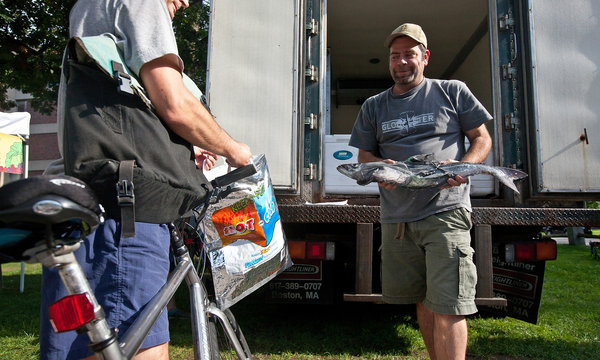If you are a frequent shopper at farmers’ markets, you may know about Community Supported Agriculture groups (CSAs), through which customers purchase fresh produce from local farmers by pre-paying their shares in advance. These arrangements support locally grown food (and thus local growers), reduce the miles-traveled for produce (thus reducing our diet’s carbon footprint), and provide city-dwellers with seasonally-appropriate, naturally grown goods (thus limiting our dependence on produce grown in environmentally-harmful circumstances). CSAs have become enormously popular in NYC and around the world.
To add a new twist to the sustainable food movement, Community Supported Fisheries (CSF) have emerged in New York City. Currently, only seven CSFs exist in the Big Apple. This number, however, is likely to increase as environmental organizations continue to raise awareness about sustainable seafood.
Matt Gove and Gaya Sriskanthan are the owners of the Big City Fish Share (BCFS), the first CSF dedicated to servicing Manhattan. Their organization is committed to providing local, sustainably-caught, and chemical-free seafood. This triple bottom line approach is vital to consumers and the environment because it addresses three major problems that exist in our seafood economy:
Wait a minute. Isn’t the FDA supposed to oversee this industry and protect consumers from food contamination? The FDA claimed to adopt a more rigorous inspection system after the Government Accountability Office audit released in April 2011, alerting Americans to the safety issues with imported seafood. However, the FDA faces challenges in its efforts to prevent tainted fish from entering the US market. For example, importers can simply play a cat-and-mouse game by reloading a rejected shipment onto another boat and thereby eluding detections.
Even if the FDA were able to successfully ban all of the tainted imported seafood, you as a consumer are still vulnerable to the global fish-identity crisis. According to the December 2011 Consumer Report Magazine, “more than one-fifth of 190 pieces of seafood we bought at retail stores and restaurants in New York, New Jersey, and Connecticut were mislabeled as different species of fish, incompletely labeled, or misidentified by employees.” As a consequence, you could end up paying a higher price for the least expensive cuts of fish without knowing what you were buying.
Keeping these facts about the fish industry in mind, are CSFs a viable alternative for you? CSFs provides three major benefits while directly addressing the aforementioned problems. First, the fish are caught naturally in local areas. Second, CSFs cut out the middle men and effectively mitigating the issue of mislabeling. Finally, CSFs give small-boat fisheries the option of harvesting seasonally available fish, in order to reduce the problem of overfishing caused by the outrageous demand for particular species. If you are health conscious, and you want to know where you seafood comes from, then you should give a CSF a try and support local fishermen who advocate responsible fishing.
For more information or to find a CSF near you, check out all the hyperlinks in this article, and in particular this CSF Finder from LocalCatch.org. Also look out for the upcoming published interview with Matt and Gaya from Big City Fish Share, coming to City Atlas soon.
Photo: NYTimes.com
